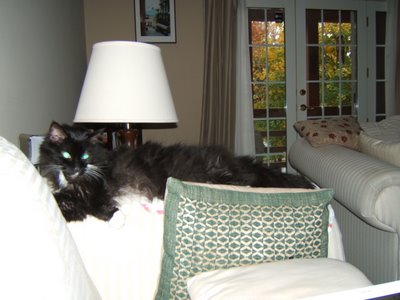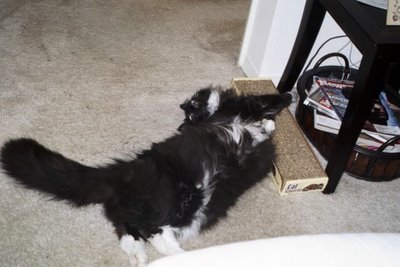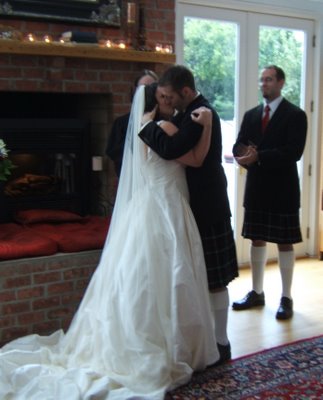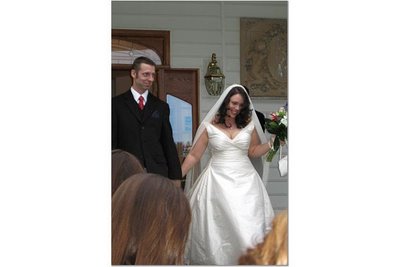Hello! As it is the holiday season (ok, I know I am a bit late with that, but bear with me)…I can’t help but recall the “Nutsacker” from last year – the Baltimore version of the Nutcracker Ballet. We saw nothing nearly as riveting or entertaining this year.
So, yes..we are alive and well in Wellington, New Zealand. Of course, you three readers probably already know this if you are reading our other blog (and if for some reason you don’t have the link, send me an email, and I’ll give it to you). So, then, no reason to recreate all the updates here.
I will still post here now and then, if I want to talk about something that doesn’t fit in with the feel of the NZ blog. In that spirit, I saw this on another blog, and decided I’d like to do it here. It’s a difficult one, because I tend to say whatever I want to anyone I want. Here goes -
List ten things you want to say to people you know but you never will, for whatever reason. Don't say who they are. Use each person only once.
1. Can’t believe you answered my long letter with a short email. Your marriage is a sham, and she is going to eventually kill you and take all your money to support her slutty, lazy daughter.
2. I can’t believe I never realized how selfish and needy you are. All I wanted was one day that was mine – my wedding day – and you just couldn’t pull yourself together to be supportive and happy for me. I’m sorry you hated your own wedding day, and that your marriage is a miserable one. Get a divorce already or get some serious therapy before one of you has a heart attack!
3. I’m sorry things ended badly with us. You were a great friend to me when I needed one, and I was hoping to reconnect with you now that things are going well for me. I’m sorry I picked the wrong day for that. Hope you are doing well and that you are happy.
4. I am certain we would have been friends if we had met in person and not on cyberspace. I enjoy reading your blog, and hope that it continues to be good therapy for you. I will continue to write any supportive words I can, but probably will never tell you who I am.
5. You make me feel short and unpretty whenever you are near me, and I honestly feel that you want me to feel that way. I hope one day you can realize and appreciate me without feeling so threatened that you need to give me backhanded compliments.
6. Please don’t marry him. You deserve a strong man who will put you first…a man who you don’t need to make excuses for.
7. I love you, and I’m a better person because of you. You probably know that, but now I’m really far away.
Ok, that’s all I can think of for now.
Happy Holidays everyone! Here’s to a happy and prosperous New Year.
Wednesday, December 27, 2006
Monday, October 30, 2006
One Week!
Life is just hurtling along! Another step toward New Zealand! The movers will be here in one week to pack up our entire house and move it to Wellington. GAH!
Sunday, October 29, 2006
Farewell, my sweet kitty

Do Not Weep" by Mary E. Frye (1932)
Do not stand at my grave and weep.
I am not there, I do not sleep.
I am a thousand winds that blow.
I am the diamond glints on snow.
I am the sunlight on ripened grain.
I am the gentle autumn rain.
When you awaken in the mornings hush, I am the swift uplifting rush of quiet birds in circled flight, I am the soft stars that shine at night.
Do not stand at my grave and cry, I am not there, I did not die...

Monday, October 23, 2006
Figgy

I'm facing the horrible moment of when I will say goodbye to my cat. I've known for a while that this moment would come, but it's not quite how I imagined it would be. When Darren and I decided to move to New Zealand, we knew there was a great chance Figgy couldn't come with us due to the long trek and the quarantine. Knowing Figgy, the process would be torture for him, and it seemed selfish to make him suffer through all that just to have him with us.
Figgy showed up at one of of the most difficult times in my life. I was living in a city that I hated, in an apartment I had once shared with the boyfriend I had moved to Pittsburgh to be with, and I was all but fired from my job. He was a scruffy very tiny kitten - too small to have climbed the fence around my yard. I took him in and immediately fell in love with him. As he grew, he only became more and more handsome, and definitely a mama's boy.
He came with me as I started my new life in an apartment of my own, and then on the road with me as I worked in Arizona, Dallas, Minneapolis and Hartford. He didn't mind flying at all, but eventually grew weary of all the different hotel rooms that smelled like other people and animals. When I finally settled in Columbia, he tolerated the apartment we first lived in until I could afford to buy more space for him to stretch out.
Figgy has seen me through job losses and break-ups, but also all the good times, too - buying a place of my own, meeting Darren and getting married. Granted, he hated the sound of my crying, and often 'yelled' at me to stop or bit me, but he always cuddled with me when I needed him. Figs often acts like a dog - he runs to the door when I get home, follows me from room to room, and will not go upstairs to bed until I do. At night, he lays on my chest while I pet him, and then curls up by my feet.
Over the past few months, Darren and I have been trying to figure out who could take Figgy. I've had him all of his 10 years, and I know all his quirks. How could I be sure that someone else would love him as much as I do? How could I be sure that they would remember not to trap him when vacuuming or to tell the vet he doesn't like a towel placed over his head, even if he is acting up? And what about those late-night urges to cuddle while purring super-loud? Would a stranger (or even a friend) put up with that? Most of our friends were ruled out because they already had cats or dogs - Figgy is very dominant and doesn't get along with other pets very well. This has been a constant source of stress since we booked our tickets to New Zealand.
This weekend, Figgy started drooling a lot while after eating or cleaning himself. I noticed the past few weeks that he had not been grooming as well, but figured his fur had just gotten out of hand. Today the vet confirmed my worst fears - Figgy has a cancerous tumor on his jaw, which is partially obstructing his mouth. As time goes on, and the tumor grows, he will have more and more difficulty eating and grooming. He is not in pain now, and he seems to be handling the discomfort ok. Still, I cannot be selfish and drag out his life until he is no longer capable of feeding himself. He is such a strong, big, handsome cat - I cannot see him as a frail sickly cat. The end is very near, and I find it is much more difficult than what I had imagined.
The stress of finding him a home is no longer there, but I feel like my heart is breaking every time I look at him and imagine him as a kitten. I stare at him every moment I'm home, trying to memorize how he looks curled up on the couch, or eating, or how his purr sounds when I'm petting him. I want to soak up every last moment with him before I have to let him go.
*sigh* You'd think I'd have run out of tears by now. =(
Ok, now for more pictures:




Monday, September 25, 2006
If only...
I read this editorial by Jonathan Alter in the September 18th Newsweek. Could it have been this way? Or is it a case of 20/20 hindsight?
For those who want to skip all the ads on the page, the text:
An Alternate 9/11 History
Sept. 18, 2006 issue - Five years after 9/11, the world is surprisingly peaceful. President Bush's pragmatic and bipartisan leadership has kept the United States not just strong but unexpectedly popular across the globe. The president himself is poised to enjoy big GOP wins in the midterm elections, a validation of his subtle understanding of the challenges facing the country. A new survey of historians puts him in the first tier of American presidents.
As Bush warned, catching terrorists wasn't easy, but he kept at it. At the battle of Tora Bora, CIA operatives on the ground cabled Washington that Osama bin Laden was cornered, but they desperately needed troop support. Defense Secretary Donald Rumsfeld immediately dispatched fresh forces, and the evildoer was killed. While bin Laden was seen as a martyr in a few isolated areas, the bulk of the Arab world had been in sympathy with the United States after 9/11 and shed no tears. After their capture, Khalid Shaikh Mohammed and other 9/11 terrorists were transported to the United States, where they were tried and quickly executed.
Today, Al Qaeda remains a threat but its opportunities for recruitment have been scarce, and the involvement of the entire international community has helped dramatically reduce terrorist attacks worldwide. Because Bush believes diplomacy requires talking to adversaries as well as friends, even Syria and Iraq were forced to help. By staying "humble," as he promised in 2000, he preserved much of the post-9/11 good feeling abroad, which paid dividends when it came time to pull together a coalition to handle North Korea and Iran.
At home, some aides suggested that Bush simply tell the nation to "go shopping." But the president knew he had a precious opportunity to ask Americans for real sacrifice. He took John McCain's suggestion and pushed through Congress an ambitious national-service program that bolstered communities and helped train citizens as first responders.
Soon Bush put the country on a Manhattan Project crash course to get off oil. He bluntly told Detroit that it was embarrassing that Chinese automakers had better fuel efficiency, he classified SUVs as cars, and he imposed a stiff gas tax with a rebate for the working poor. To pay for it, he abandoned his tax cuts for the wealthy, reminding the country that no president in history had ever cut taxes in the middle of a war. This president would be damned if he was going to put more oil money into the pockets of Middle Eastern hatemongers who had killed nearly 3,000 of our people. To dramatize the point, he drove to his 2002 State of the Union address in a hybrid car. Sales soared.
When Karl Rove suggested that the war on terror would make a perfect wedge issue against Democrats in the 2002 midterms, Bush brought him up short. Didn't Rove understand that bipartisanship is good politics? Lincoln and FDR had both gone bipartisan during wartime, he reminded his aide. So when evidence of torture at the prison camp in Guantánamo Bay surfaced and Rumsfeld was forced to resign, former Democratic senator Sam Nunn got the job. With post-9/11 unity still at least partially intact in 2004, Bush was re-elected in a landslide.
Taking a cue from Lincoln's impatience with his generals, Bush was merciless about poor performance on homeland security. When the head of the FBI couldn't fix the bureau's computers in a year's time to "connect the dots," he was out. And Bush had no patience for excuse-making about leaky port security, unsecured chemical plants and first responders whose radios didn't communicate. If someone had told him that five years after 9/11 these problems would still be unsolved, Bush would have laughed him out of the office.
In 2003, Vice President Cheney advised the president to take out Iraq's Saddam Hussein militarily. But Bush was beginning to understand that his veep, while sounding full of gravitas, was in fact reckless. When it became clear that Saddam posed no imminent threat, Bush resolved to neuter him, Kaddafi style. When the president found, after a little asking around, that the 10-year cost of invading Iraq would be a crushing $1.2 trillion, he opted out of this war of choice.
Five years after that awful September day, even Bush's fiercest critics have learned an important lesson: leadership counts. Imagine if we'd done the opposite of these things. This country—and the world—would be in a heap of trouble.
For those who want to skip all the ads on the page, the text:
An Alternate 9/11 History
Sept. 18, 2006 issue - Five years after 9/11, the world is surprisingly peaceful. President Bush's pragmatic and bipartisan leadership has kept the United States not just strong but unexpectedly popular across the globe. The president himself is poised to enjoy big GOP wins in the midterm elections, a validation of his subtle understanding of the challenges facing the country. A new survey of historians puts him in the first tier of American presidents.
As Bush warned, catching terrorists wasn't easy, but he kept at it. At the battle of Tora Bora, CIA operatives on the ground cabled Washington that Osama bin Laden was cornered, but they desperately needed troop support. Defense Secretary Donald Rumsfeld immediately dispatched fresh forces, and the evildoer was killed. While bin Laden was seen as a martyr in a few isolated areas, the bulk of the Arab world had been in sympathy with the United States after 9/11 and shed no tears. After their capture, Khalid Shaikh Mohammed and other 9/11 terrorists were transported to the United States, where they were tried and quickly executed.
Today, Al Qaeda remains a threat but its opportunities for recruitment have been scarce, and the involvement of the entire international community has helped dramatically reduce terrorist attacks worldwide. Because Bush believes diplomacy requires talking to adversaries as well as friends, even Syria and Iraq were forced to help. By staying "humble," as he promised in 2000, he preserved much of the post-9/11 good feeling abroad, which paid dividends when it came time to pull together a coalition to handle North Korea and Iran.
At home, some aides suggested that Bush simply tell the nation to "go shopping." But the president knew he had a precious opportunity to ask Americans for real sacrifice. He took John McCain's suggestion and pushed through Congress an ambitious national-service program that bolstered communities and helped train citizens as first responders.
Soon Bush put the country on a Manhattan Project crash course to get off oil. He bluntly told Detroit that it was embarrassing that Chinese automakers had better fuel efficiency, he classified SUVs as cars, and he imposed a stiff gas tax with a rebate for the working poor. To pay for it, he abandoned his tax cuts for the wealthy, reminding the country that no president in history had ever cut taxes in the middle of a war. This president would be damned if he was going to put more oil money into the pockets of Middle Eastern hatemongers who had killed nearly 3,000 of our people. To dramatize the point, he drove to his 2002 State of the Union address in a hybrid car. Sales soared.
When Karl Rove suggested that the war on terror would make a perfect wedge issue against Democrats in the 2002 midterms, Bush brought him up short. Didn't Rove understand that bipartisanship is good politics? Lincoln and FDR had both gone bipartisan during wartime, he reminded his aide. So when evidence of torture at the prison camp in Guantánamo Bay surfaced and Rumsfeld was forced to resign, former Democratic senator Sam Nunn got the job. With post-9/11 unity still at least partially intact in 2004, Bush was re-elected in a landslide.
Taking a cue from Lincoln's impatience with his generals, Bush was merciless about poor performance on homeland security. When the head of the FBI couldn't fix the bureau's computers in a year's time to "connect the dots," he was out. And Bush had no patience for excuse-making about leaky port security, unsecured chemical plants and first responders whose radios didn't communicate. If someone had told him that five years after 9/11 these problems would still be unsolved, Bush would have laughed him out of the office.
In 2003, Vice President Cheney advised the president to take out Iraq's Saddam Hussein militarily. But Bush was beginning to understand that his veep, while sounding full of gravitas, was in fact reckless. When it became clear that Saddam posed no imminent threat, Bush resolved to neuter him, Kaddafi style. When the president found, after a little asking around, that the 10-year cost of invading Iraq would be a crushing $1.2 trillion, he opted out of this war of choice.
Five years after that awful September day, even Bush's fiercest critics have learned an important lesson: leadership counts. Imagine if we'd done the opposite of these things. This country—and the world—would be in a heap of trouble.
Open Letter
An open letter to all of those running for office in Maryland this November:
To Whom it May Concern:
If I see you standing on the side of the road waving at me during my morning commute - especially if you are standing on an exit ramp blocking the one part of my windshield I can actually see out of (as the glare of the rising sun and condensation have obstructed the rest of my view) - I will take down your name and make sure I check any box BUT yours on election day.
If you would like my attention and my vote, send me a letter and tell me why. Do not encourage me and other drivers to focus on your waving hand instead of exiting safely while fighting traffic, glare and random animals.
Thank you
To Whom it May Concern:
If I see you standing on the side of the road waving at me during my morning commute - especially if you are standing on an exit ramp blocking the one part of my windshield I can actually see out of (as the glare of the rising sun and condensation have obstructed the rest of my view) - I will take down your name and make sure I check any box BUT yours on election day.
If you would like my attention and my vote, send me a letter and tell me why. Do not encourage me and other drivers to focus on your waving hand instead of exiting safely while fighting traffic, glare and random animals.
Thank you
Thursday, September 21, 2006
Ok, me too...
Saw this in Heather's blog today, and so I'm shamelessly copying this Johari Window business:
http://kevan.org/johari?name=Baaaaaa
Check it out...read the directions and pick some words that you think describe me. Sorry, "bitch" isn't listed - you'll just have to get creative.
http://kevan.org/johari?name=Baaaaaa
Check it out...read the directions and pick some words that you think describe me. Sorry, "bitch" isn't listed - you'll just have to get creative.
Thursday, September 14, 2006
Subscribe to:
Posts (Atom)

